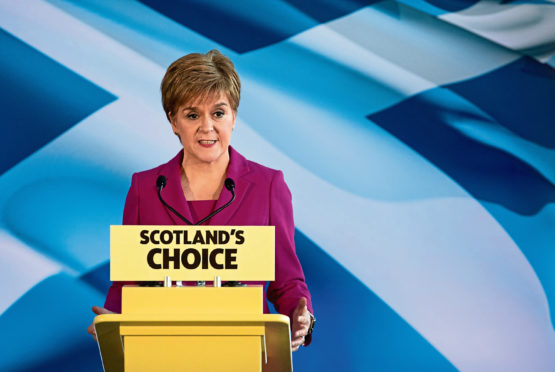Scotland’s Angela Merkel – those who like Nicola Sturgeon, like her a lot. Weighed against Boris, she seems more sensible. Against her predecessor, Alex, more dependable. People feel she’ll do right by the nation.
However, the virus has exposed her weakness. She looks like a leader, she sounds like one, but she doesn’t lead.
To lose a chief medical officer to second home entitlement was unlucky. To have another scientific adviser flee to a second home on Lismore was very unlucky. To discover a top legal official to the government was actually a property developer on the side was bizarre.
Officialdom disappoints, Sturgeon is unharmed. Improved even, by not being one of the entitled class. Then one minister cheats Scots out of the full UK financial rescue plan, and another gets into an embarrassing mess over the policy reversal. So Fiona Hyslop and Kate Forbes screw up, but that’s just the burden Sturgeon must carry.
In Sturgeon we trust. But the facts tell a different tale. Our leader is accused of doing no such thing. She doesn’t lead, but cautiously follows, except where a slim margin of difference is required for political purposes.
A report from health systems experts Allyson Pollock and Louisa Harding-Edgar says far from being independent of London’s approach, Sturgeon was wedded to its actions.
“(The) Scottish Government has allowed its strategy and the operations to be directed by Westminster,” write the authors.
They say England had its first case in January – Scotland’s came in March. Had Scotland acted sooner and recognised the difference in challenge between Dundee and Aberdeen compared with the Highlands and islands, then Scotland might have a lower death toll.
The report puzzles over why Scotland abandoned tracing on March 12, in line with the UK Cobra committee decision. With so many fewer cases, Scotland could have stuck to the World Health Organisation advice and managed the outbreak through tracing and quarantine.
The authors say Sturgeon’s ban on mass gatherings was “too little too late”. It is very hard to find evidence of a distinctive Scottish approach, beyond the marginally earlier call to close schools compared with England.
The authors don’t argue for difference on nationalist grounds, but health ones. They ask, why didn’t Nicola lead?
To make matters worse, it was revealed on Sunday that Sturgeon had missed six Cobra meetings before March. When Johnson was revealed to have skipped five, the SNP crowed. Now they looked silly. Scotland has been woefully short of PPE, but the government failed to respond when Scottish firms offered to supply the equipment in early March. Pollock’s report hints at a deeper truth.
Sturgeon has never led us in the best interests of Scotland – no “Scottish laws to Scottish problems”, in the words of Donald Dewar. Instead, we are governed much as the rest of the UK but with rhetorical gloss which denies this.
Pollock points out that England’s response to the virus was hampered by the centralisation of the NHS. The system is overly dependent on decisions from Downing Street. Pollock says the same is true of Scotland, where the NHS is overseen by Health Protection Scotland. Local resources have been run down and decision-making brought to Edinburgh.
The SNP government may talk a different game but, like a UK Conservative government, it has set about weakening local government, centralising police and fire services, merging organisations, centralising the NHS.
Set aside the political claims of difference and look at the facts – only one conclusion is possible. Thirteen years of Nationalist governance, six of it under Sturgeon, have kept Scotland much the same.
The SNP never want to admit this and it doesn’t suit the Unionist case to tell the truth either. It is, however, the reality.
Sturgeon does not lead for the sake of Scotland’s needs. The lockdown has provided a weird but ideal moment for leadership. We are sat at home, a captive audience receptive to new policies. And yet the FM had the brass neck to write a newspaper article last Sunday with the nauseatingly saccharine message that “together” we could imagine a new Scotland.
Every year of government the SNP has asked us to dream. Every year it doesn’t act on what we say. Leadership comes to mean controlling a party and a constitutional message.
Voters trusted Nicola to deliver. She had the powers to better protect Scotland from the virus. She didn’t use them. She has the powers to deliver a different Scotland. She doesn’t use them. The nation could be listening to new policies on health, the environment and education. Sturgeon could tell us about car use after lockdown, and what’s to be done for domestic abuse victims, or the homeless currently in hotels. She could tell us how NHS resources will be restored, and how to improve care for the elderly. Dream on.
No Merkel then. Steady as she looks at the daily briefing, we are coming to see Sturgeon’s truth. Held back by idle officials and dim colleagues, yes but, more importantly, by her own caution. If not now, when is the time to lead?

